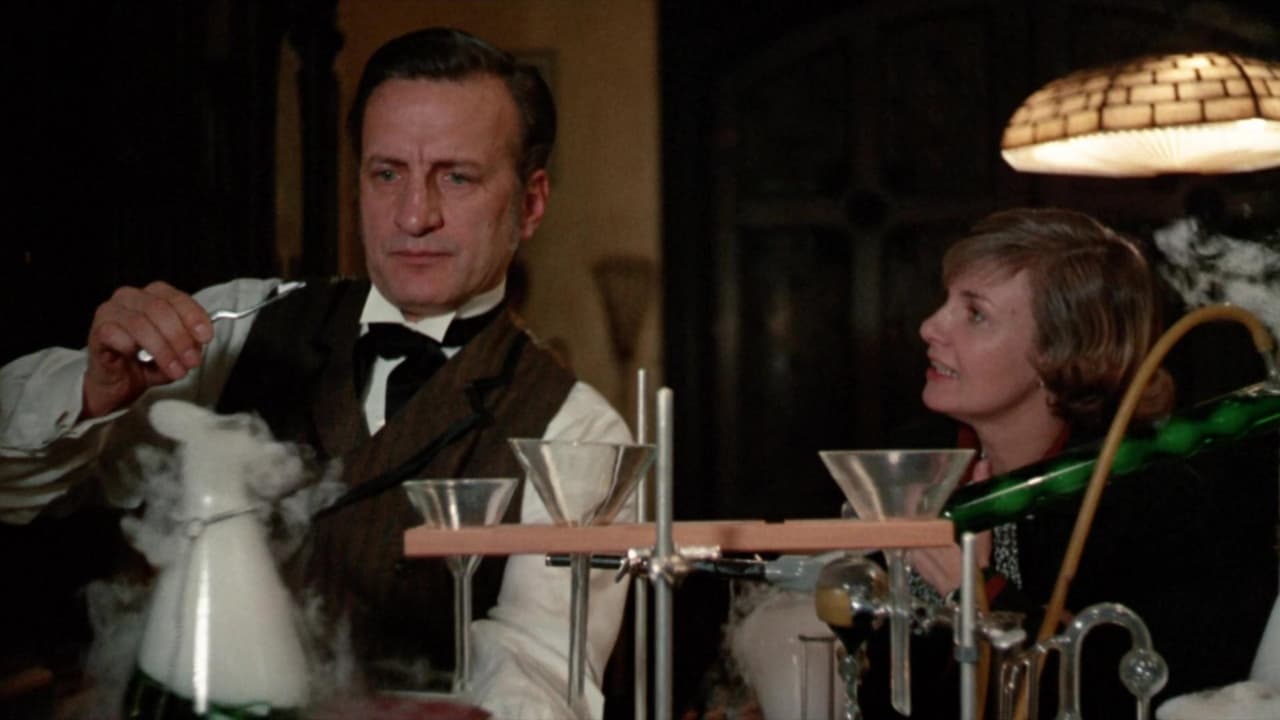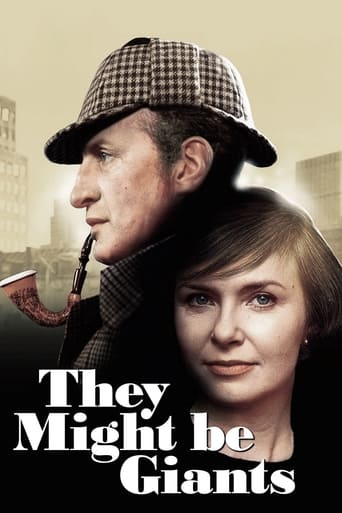Linbeymusol
Wonderful character development!
Actuakers
One of my all time favorites.
Breakinger
A Brilliant Conflict
Philippa
All of these films share one commonality, that being a kind of emotional center that humanizes a cast of monsters.
calvinnme
This is a quirky, oddly affecting comedy about a judge, gone psychotic after the death of his wife, who believes that he is Sherlock Holmes. His brother wants him committed to an asylum, not for reasons of concern, but so that he can become executor of the would be Holmes's considerable estate.A female psychiatrist is asked to interview him for the formality of the commitment but becomes fascinated by the "Holmes" she meets because of his truly extraordinary deductive reasoning. It's apparent that, delusional or not, he may be a genius of some kind, and far more fascinating than most ordinary mortals.The psychiatrist, whose name just happens to be Watson, joins this Sherlock Holmes in his quest to search the streets of New York City for his nemesis, Professor Moriarty. On the way they meet various other people, also largely spurned by society, but, somehow, kindred souls in an otherwise pretty cold world.This strange but intelligent, utterly charming film died a quick death at the 1971 box office, but has found a cult following of sorts over the years. George C. Scott, with briar pipe and deerstalker hat, is virtual perfection in the role of the man who believes he is Holmes, while Joanne Woodward, devoid of her usual glamour, playing the socially awkward psychiatrist who starts to gradually believe in his cause, brings a warmth and touching vulnerability to her role.The film has a few wonderful scenes with lovely little touches. Holmes takes his Watson to a little movie theatre, almost empty but for a few street people, and a makeout couple in the top balcony. Yet the street people there all know him, greeting him with smiles as "Mr. Holmes" at this theatre where he likes to come for comfort and watch westerns.At another unexpected moment a police officer suddenly comes around the corner, spots "Holmes" and a large smile spreads across his face as he says, "Why, Mr. Rathbone, it's an honor, sir," as he reaches over to shake his hand.And, towards the film's beginning, there is a marvelous scene in which Scott, dressed as Holmes, arrives at a seedy asylum where an inmate is being abused by an orderly. There's a low angle camera shot of a towering Scott/Holmes as he struts through the hallway unruffled, dispassionately disarming orderlies who try to grab him, then proceeds to analyze the mind of the abused patient in a manner that has the patient's doctor (Watson in her first encounter of him) in almost open mouthed admiration.The film's final scene will undoubtedly baffle many viewers because of its ambiguity. It's a moment that is clearly open to interpretation. But I think that scene, and this film, are about the soaring human spirit, and a belief in one's self even though logic and all around you may tell you that you are wrong.
jurgen-manycolored
The movie is full of charm and wistfulness. So many people living in their own world. Admittedly a bit of a comic stretch in some of the scenes, the ending struck me emotionally. What it seemed to say was It is better to die on your feet with your own sense of reality than die on your knees with the reality forced on you by others. And the ending is a composite of that and the true reality of imminent death. That last scene allowed me to take the spiritual (if you will) content of the movie above what went before. A small gem hidden in the earth.Scott and Woodward hold up their end as far as the acting goes. Jack Gilford is miscast; Lester Rawlins speaks his lines woodenly; Al Lewis reminded me of Peter Laurie at the end of his career walking his shark around the swimming pool on a lead; Ron Weyand could pass for a Hassidic Jew with a southern accent in his part. It puzzles me often that supporting actors can come across so badly while the costars rise to the occasion. Yet other actors playing bit parts are quite entertaining. At any rate, if you can swallow some of the acting and get into the movie, it can hold you with its subliminal sense of other-worldliness.
reisen55
This a delicate thing to enjoy as fairy tales and fantasies are. The opening theme and titles set the whole stage and it is a glass of wine for the next 98 minutes or so. Scott and Woodward of, of course, captivating and the wonderful Jack Guilford is a national treasure. But what this film questions is "Who are we?" and what is reality. To a degree, Chaplin's CITY LIGHTS attempted this question in relation to the TRAMP and his alternative role of the MILLIONAIRE able to cure the blind girl. Who and what is real? Another film in the same genre is THE EMPEROR'S NEW CLOTHES with Ian Holm as the real Napoleon who, returning from St. Helena in 1821 finds that nobody BUT NOBODY believes him to to be the real Napoleon Bonaparte. The only fault with this film in a literal sense is that the hunt for Moriarty must be blank, there is no such person in our world who Holmes can find and confront. Like CITY LIGHTS, the ending closes without answering the question. But this is in our reality. Examine the ending with the notion that perhaps Dr. Watson, too, has crossed from our world into that of Holmes. Then it becomes much more interesting.Watch this delightful light film in a room with candles and a glass of very light wine. Savor it for it is a rare gem. I have given it an 8 out of 10 but in another reality, it may be a 10 out of 10. IF you can cross over to that reality.
MARIO GAUCI
I started out my mini Paul Newman marathon with two projects he did behind the camera and in which he didn’t appear but instead highlighted his wife’s acting talent. The effective lead here is actually Newman’s own co-star from THE HUSTLER (1961), George C. Scott, as a lawyer who had a nervous breakdown after his wife’s death and which resulted in his taking on the persona of Sherlock Holmes! This quirky, amiable but not entirely successful comic fantasy allows Scott to again show his considerable (but often neglected) skills at comedy which had served him so admirably in Stanley Kubrick’s DR. STRANGELOVE (1964). Joanne Woodward is Dr. Mildred Watson, the psychoanalyst who takes Scott under her care and whom he (given her surname) mistakes for his genial literary companion and is soon off in search for his eternal nemesis Professor Moriarty in modern-day New York! The cast also includes Jack Gilford, Al Lewis, Kitty Winn and a debuting F. Murray Abraham as various misfits and oddballs who join Scott and Woodward in their Quixotic quest for the invisible evil mastermind.The film’s unsatisfactory and enigmatic conclusion (a slapstick supermarket chase involving Scott, Woodward, Gilford et al and the N.Y.C. Police is followed by a ‘supernatural’ encounter between Holmes, Watson and an unseen Moriarty in a tunnel) makes the whole affair somewhat pointless…except perhaps to imply that a retreat into one’s imagination is necessary if one is to survive the real madness that is modern civilization. In any case, executive producer Newman must have been impressed by THE LION IN WINTER (1968) since he engaged three of its major crew members for this one – director Harvey, screenwriter James Goldman (who adapted his own play for the screen) and composer John Barry (who contributes a nice moody score). The film’s running time was originally 88 minutes but it was subsequently lengthened to 98 for TV screenings; the version I got, then (that is the one also available on the now-OOP Anchor Bay DVD), runs for 92! In the end, I was hoping to like this more than I did – and it’s just as well that I opted not to purchase the DVD (which contained an Audio Commentary featuring Anthony Harvey and noted film restorer Robert A. Harris).

